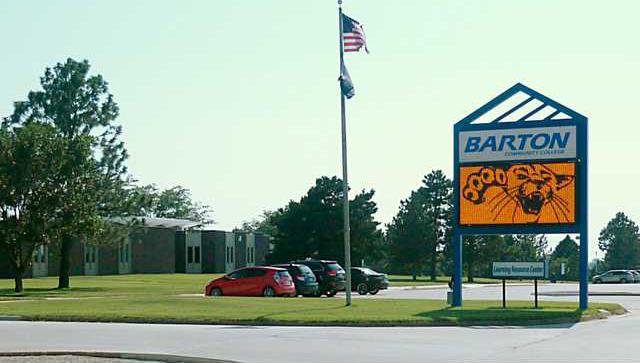Cuts in federal grant funding pose new challenges to programs at Barton Community College. The challenges and possible solutions were discussed at Tuesday’s Board of Trustees meeting when Director of Grants Krystall Barnes reported. These include finding new funding for RSVP/AmeriCorps, whose federal funding has been reduced by $400 million nationwide.
“We lost our RSVP funding,” Barnes said, adding, “It was a big cut nationwide. More than 1,000 programs were cut nationwide.”
Barton has been a sponsor of the program for 49 years and is supportive of the program, Barnes said. The college provides support such as office space for the local director.
“I talked to Linn Hogg who has been running our program for 14 years,” she said. Hogg knows directors regionally and nationwide, and the consensus is that rural programs were harder hit than urban programs. “Over 1,200 meals on wheels are delivered every month (in our area). This is big for our seniors.”
Solutions
Barnes said the Barton Foundation is taking the lead to secure future funding and support. It is working with other foundations and community partners such as United Way to find ways to collaborate to keep those services going. The college is looking for new local, corporate, foundation and federal grant opportunities.
Barton President Dr. Marcus Garstecki said these are critical services. “I appreciate what people are doing to keep it going.”
TRIO programs
Barnes said funding for federal TRIO programs is also in jeopardy. They are also targeted for elimination in the federal administration’s proposed 2026 “skinny budget” that the House of Representatives passed in the One Big Beautiful Bill Act. The Senate has not yet voted on the act and the final version could change.
“They have to go through that whole process of examining everything,” Barnes said.
TRIO programs are funded by the U.S. Department of Education and serve first-generation, low-income students and students with disabilities. There were 800 programs across the United States. Barton has four:
• Barton County Upward Bound (BCUB) serves 60 students a year.
• Central Kansas Upward Bound (CKUB) serves 60 students a year.
• Educational Opportunity Center (EOC) serves 1,000 students in a 35-county area – not just Barton’s service area.
• Student Support Services (SSS) serves 200 students a year.
Vice President Mark Dean said Congress has already allocated the money for these multi-year grants but it’s being held.
CKUB is the program that comes up first and Barnes said there have been some reassurances that the funds may be awarded. “We have to wait and see. They really don’t have any answers for us yet.”
“There’s obviously an appetite in DC to cut these programs,” Garstecki said, noting first-generation students are more successful with assistance that TRIO can provide. “Hopefully we can continue to work through it.”
Barnes concluded that the fate of federal grants continues to change and she may learn more any day. “We are taking it day by day.”
Barton’s proposed solutions to the new challenges are to advocate at the local, federal and state levels. Advocates are creating awareness of TRIO programs’ impact on students. Barnes maintains contact with and receives guidance from the Council for Opportunities in Education (COE) and the national TRIO program. Among other things, they are collecting success stories from alumni.
Other grants
Barnes’ report was on grant programs also included the Adult Education & Family Literacy Act, funded by the Kansas Board of Regents (KBOR) via the U.S. Department of Education. Adult Ed helps clients earn GED, and offers assistance such as tutoring services and job referrals. It helped 120 students this year.
Carl Perkins CTE (Career Technical Education) grants are applied for every year through the Department of Education.
KBOR offers short-term grants. Recent funding paid for state-of-the-art equipment, such as an ambulance simulator for the Nursing Department and the APEX Officer virtual reality (VR) system for the Criminal Justice Department. The Office of Broadband Development (KOBD) is funding community digital literacy through Barton’s Workforce Training and Community Education (WTCE) Division. The Kansas Arts Council supported the Barton County “Nutcracker” performance.
There are also partnerships with Fort Hays State University and Kansas State University. The Classroom to Classroom project with FHSU helps recruit future teachers from rural areas. Students start with scholarships at Barton before they transfer to Fort Hays. Both FHSU and K-State partnerships help Barton offer support for students in STEM (Science, Technology, Engineering and Mathematics) programs. Barnes noted that Barton has an active STEM club that was created through this grant.
For clarification, Linn Hogg is director of the Volunteers in Action (VIA) of Central Kansas and AmeriCorps Seniors Programs. RSVP, formerly the Retired Senior Volunteer Program, is part of AmeriCorps Seniors, and has been replaced in Great Bend by VIA. Other services provided are medical transportation, Medicare counseling and AARP tax preparation.




